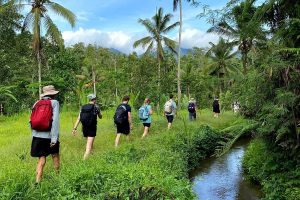Introduction: More Than Honey
Bees are more than just honey makers; they are the silent architects of life itself. Every time we bite into a juicy mango, admire a blooming frangipani, or breathe in the fresh air of Bali’s forests, we are enjoying the gifts that bees help create. Without them, our food, flowers, and forests would not thrive. In Bali, bees play a very special role in both nature and culture, and one local guardian is making it his mission to protect them: Yan.
Yan: Bali’s Guardian of Bees
In the heart of Bali, Yan has dedicated his life to living in harmony with bees. Unlike many commercial beekeepers, Yan’s approach is gentle, respectful, and deeply connected to the rhythms of nature. He doesn’t see bees as mere producers of honey, but as partners in creating a healing environment.
Yan’s beekeeping is about more than harvesting honey. He creates spaces where people can experience the calming hum of bees, breathe the fresh, medicinal air of the hive, and observe the intricate beauty of bee life up close. Through his workshops and educational programs, Yan invites locals and visitors alike to reconnect with bees, not as resources to be exploited, but as living beings to be respected and protected.
Workshops and Education: Learning from the Bees
Yan’s workshops are not your typical classroom experience. Picture a group of schoolchildren or curious adults gathered around an observation hive, watching bees dance, build, and communicate. Yan gently explains how each bee has a role, how the colony works together, and how their work keeps Bali’s gardens and farms alive.
Participants learn about the importance of bees in pollination, the threats they face from pesticides and habitat loss, and simple ways anyone can help. Yan often shares stories of traditional Balinese respect for bees, reminding everyone that harmony with nature is at the core of Balinese culture.
One of the most memorable parts of Yan’s workshops is hearing about the “healing hive.” Where people lie above a beehive and listen to the gentle vibration of thousands of wings, a sound many find deeply calming. Some even experiment with “bee air therapy,” breathing the warm, aromatic air from the hive, believed in some traditions to support respiratory health. Yan is careful to explain the science and tradition behind these practices, always prioritising the safety and well-being of both people and bees.
Understanding Bee Aggression: A Message, Not a Threat
Bees in Bali, like everywhere, are sometimes labelled as “killer” when they defend their hive more aggressively than usual. Yan teaches that this behaviour is not a sign of malice, but a message. Bees are not our enemies; they are trying to tell us something important.
When bees become aggressive, it is often because they are under stress. Commercial beekeeping practices, such as replacing honey with sugar syrup, exposing bees to chemicals, and overworking colonies for mass production, can weaken bees and disrupt their natural harmony. Yan explains that when bees feel threatened or exploited, they defend their community, just as humans would protest if their homes or families were at risk.
Their stings are not only for defense, but also a wake-up call for us: live with bees in harmony, not in slavery. If we respect bees, stop commercial exploitation, and allow them to live naturally, they will continue to be our greatest allies in health, healing, and the balance of nature.
How You Can Help Save the Bees in Bali
Yan believes everyone can play a part in saving the bees, whether you live in Bali or are just visiting. Here’s how:
1. Plant Bee-Friendly Flowers
Bees need nectar and pollen from a variety of flowers to survive. In Bali, some of the best plants for bees are:
- Goldenrod (see image): Bright yellow flowers that bloom in clusters, rich in nectar and loved by bees and butterflies.
- Orchids (see image): Many native orchids, like the Dendrobium species, attract wild bees and provide important food sources.
- Night-blooming Cereus (see image): Also known as “Queen of the Night,” this cactus produces stunning white flowers that open at night, attracting nocturnal pollinators including bees and moths.
- Herbs and wildflowers: Basil, mint, lemongrass, and native Balinese wildflowers are also excellent choices.
The key is to plant a variety of species, ensuring that something is always in bloom throughout the year. Avoid hybrid or double-flowered varieties, which often produce less nectar.
2. Avoid Pesticides
Even small amounts of pesticides can harm bees. Yan encourages natural gardening methods, such as companion planting, hand-picking pests, and using neem oil or soap sprays only when absolutely necessary.
3. Support Local Beekeepers
Buy honey and bee products directly from ethical, small-scale beekeepers who respect the bees and harvest only what the colony can spare. This supports both biodiversity and the local economy.
4. Create Safe Spaces for Bees
You don’t need to be a professional beekeeper to help. Simple bee hotels made from bamboo, or leaving some wild areas in your garden, can provide nesting sites for solitary bees. Even a small balcony can become a haven for pollinators.
5. Educate Others
Yan’s greatest impact comes from sharing knowledge. Talk to your neighbours, friends, and family about the importance of bees. Host a workshop, share a video, or invite people to observe bees in action.
6. Support Bee-Friendly Tourism
If you’re a tourist in Bali, choose eco-friendly hotels and ask about their bee policies. Some resorts now keep bees in their gardens to support pollination and biodiversity. By choosing these places, you support a growing movement.
7. Advocate for Change
Encourage local leaders to support pollinator-friendly farming, protect wild habitats, and adopt laws that safeguard bees from harmful chemicals and habitat loss.
Why Bees Matter: The Bigger Picture
Bees are disappearing around the world due to pollution, pesticides, deforestation, and over-exploitation. By protecting bees in Bali, we also protect the balance of nature, the beauty of our environment, and the health of future generations.
Bees pollinate not just crops, but also wild plants that form the foundation of Bali’s forests and rice terraces. They help produce the fruits, nuts, and seeds that feed countless animals, including us. Without bees, the entire food web would unravel.

The Flowers That Feed Bali’s Bees
Let’s look more closely at some of the flowers from your images that are vital for bees in Bali:
Goldenrod:
A powerhouse for pollinators, goldenrod blooms in late summer and autumn, providing a crucial nectar source when other flowers are scarce. Its bright yellow clusters attract honeybees, native bees, and butterflies.
Orchids (Dendrobium species):
These elegant, often white-flowered orchids are native to Bali’s forests. They provide both nectar and shelter for wild bees, which in turn help pollinate the orchids and maintain biodiversity.
Night-blooming Cereus (Queen of the Night):
This spectacular cactus opens its fragrant white flowers at dusk, attracting nocturnal bees and moths. Though each bloom lasts only one night, it offers a feast for pollinators and a magical sight for anyone lucky enough to witness it.
Other Important Flowers:
- Basil, mint, lemongrass: Easy to grow and loved by bees.
- Wildflowers and native shrubs: Leaving some areas untamed helps wild bees thrive.
Planting these flowers ensures that bees have food year-round and that your garden or land becomes a sanctuary for pollinators.
Breathing with Bees: Unique Experiences in Bali
Yan’s workshops sometimes explore the health benefits of being close to bees. Some visitors try “bee air therapy,” inhaling the warm, aromatic air from the hive, believed to support respiratory health. Others find peace simply lying above a hive, feeling the gentle vibrations and listening to the calming buzz of thousands of bees at work.
There’s even research suggesting that the sound and scent of a healthy hive can reduce stress and improve well-being. For Yan, these experiences are not about exploiting bees, but about reconnecting people with the natural world and reminding us of our shared place in the ecosystem.
Watch this fascinating video for more on bee air therapy and unique ways people interact with bees: Bee Air Therapy on YouTube
Conclusion: A Paradise for Bees and People
Bali is famous for its beauty, but true paradise is not just for people. It must include the bees and all the creatures that keep the island alive. Yan’s work shows that with respect, education, and a little effort, we can protect these vital pollinators and ensure that Bali remains a place of abundance, harmony, and healing for generations to come.
Whether you’re a local, a visitor, or simply someone who cares about the future, you can help save the bees. Plant flowers, avoid chemicals, support ethical beekeepers, and share what you learn. Together, we can make Bali not only a paradise for people, but also a paradise for bees.

If you want to learn more, join one of Yan’s workshops, visit a local bee-friendly garden, or start your own pollinator project at home. Every flower, every safe space, and every bit of knowledge shared helps build a better future for bees, and for us all.


















